1. What is prejudice
1.1. Introduction
1.1.1. prevents equal chances
1.2. Prejudge
1.2.1. unfairly without knowing the facts
1.3. Stereotyping
1.3.1. oversimplified mental image which is applied to all in the group
1.4. Discrimination
1.4.1. Unfair or unequal treatment
1.5. Positive Discrimination
1.5.1. Treating people more favourably because they have been discriminated against in the past
1.6. Scapegoating
1.6.1. Blaming certain groups for problems in society
2. Why are some people prejudiced?
2.1. Upbringing
2.2. Culture
2.3. Results in scapegoating
2.4. Socialisation
2.5. Personal experiences
2.6. Media
2.7. Fear and uncertainty about the future
2.8. Lack of education
3. Effects of prejudice
3.1. Great harm
3.2. Feel worthless
3.3. Vulnerable
3.4. Genocide
3.5. Death and suicide
4. Types of prejudice
4.1. Race & Colour
4.1.1. 'Blacks', 'Asians'
4.1.1.1. Descriptions can be misleading
4.2. Racism
4.2.1. Against the law
4.2.2. Black football players often suffer
4.2.3. belief that colour of a person's skin determines ability
4.3. Gender
4.3.1. Society creates gender specific stereotypes
4.4. Sexism
4.4.1. Gender prejudice
4.5. Women's rights
4.5.1. only in the last 50 years that women have been seen as equal to men
4.5.2. Women originally not allowed to vote
4.5.3. after WWII status began to change
4.5.4. couldn't inherit property
5. Other types of prejudice
5.1. Ageism
5.1.1. Discrimination against someone because of their age
5.1.2. Often on the basis of steretypes
5.1.3. 'past it' vs wealth of experience
5.2. Disability discrimination
5.2.1. At work or being denied access to services
5.2.2. Against a physical and mental handicap
5.2.3. in the workplaces, schools (e.g. no ramps etc)
5.3. Prejudice based on class, lifestyle and looks
5.3.1. Social class linked to background, education, job and money
5.3.2. Now WC go to uni and become MC
5.3.3. Also on interests, activities, possessons and spending habits
5.3.4. Money biggest influence
5.3.5. Influenced by the media
5.4. Religious prejudice
5.4.1. Since 9/11 Muslims have been subjected.
5.4.2. Jews in Nazi Germany
5.4.3. Often more about people's culture or ethnic group
5.4.4. Religions don't see eye to eye
5.4.5. Roman catholics discrimination in jobs
6. Religious attitudes to prejudice
6.1. Tolerance
6.1.1. UDofHR
6.1.1.1. All human beings are born free and = in dignity and rights
6.1.2. Means respecting rights not always agreeing
6.1.3. Everyone has the right to think what they want and express their opinions
6.2. Harmony
6.2.1. Means living at peace with others
6.2.2. Make people form communities and bonds with others
6.2.3. pracitce kindness compassion and generosity within communities it helps build harmony
6.3. Justice
6.3.1. Religions teach everyone =
6.3.2. Same vlalue and worth
6.3.3. If laws are not just then religious believers should strive to abolish
6.4. The value of the individual
6.4.1. Everyone created by God =
6.4.2. Treat each others as equals
7. Western Faiths
7.1. Christianity
7.1.1. God created men and women in his own image
7.1.2. Jesus said 'love your neighbour as yourself'
7.1.3. Good samaritan
7.1.4. Some Christian churches don't allow women to be priests - M/W different roles
7.1.5. 'There is neither Jew nor Greek, slave nor free, male nor female, for you are all one in Christ Jesus
7.2. Islam
7.2.1. Allah created man and woman equal
7.2.2. Muhammad preached against slavery
7.2.2.1. Also taught whoever does good work will be rewarded
7.2.3. Differences are not an excuse for unjust treatment
7.2.4. Hajj shows equality
7.2.5. Shariah law based on justice
7.2.6. Women = to men but have different roles
7.2.6.1. Men pray at mosques/women at home
7.2.6.2. Women can't be an imam
8. Eastern Faiths
8.1. Buddhism
8.1.1. Buddha left his wealthy life
8.1.2. Rejected caste system
8.1.3. Believed people only create divisions to feel superior
8.1.4. Buddha taught everyone equal chance of enlightenment
8.1.5. All people of the sangha =
9. Response to prejudices
9.1. Society and the law
9.1.1. Sex Discrimination Act 1975
9.1.2. Race relations Act 1976
9.1.3. Disability Discrimination Act 1995
9.1.4. Equality Act 2006
9.2. Groups
9.2.1. The Corrymeela Community
9.3. Individuals
9.3.1. Anthony Walker
10. Mahatma Gandhi
10.1. Born 1869
10.2. Trained as Lawyer in England
10.3. @24 went to South Africa
10.3.1. Racially discriminated against
10.4. Peaceful protest
10.5. Hindu belief in Ahimsa
10.6. shot dead
10.7. named Mahatma (great soul)
11. Martin Luther King
11.1. Early life
11.1.1. Born and lived in USA
11.1.2. @18 became Christian minister
11.2. Segregation and Discrimination
11.2.1. B&W separated
11.2.2. KKK
11.2.2.1. violence towards black people and black sympathisers
11.2.3. injustices = against MLK's Christian beliefs
11.2.3.1. Inspired by Jesus
11.2.3.2. Set out to change the laws
11.3. Civil Rights Movement
11.3.1. Montgomery Bus Boycott
11.3.1.1. organised by MLK
11.3.1.2. arrested
11.3.1.3. home bombed
11.3.1.4. death threats
11.3.2. non violent protest/peaceful protest
11.3.2.1. sit ins
11.3.3. led millions of peole on protest marches
11.3.4. TV footage persuaded all American that laws were unjust
11.4. Nobel Peace Prize - 1964
11.5. I have a dream speech
11.6. Assassinated in 1968 at the age of 39
12. Desmond Tutu
12.1. Basics
12.1.1. Born South Africa 1931
12.1.2. Anglican Priest
12.2. Apartheid
12.2.1. Separation of races
12.2.2. Policy in South Africa
12.2.3. Whites seen as superior
12.2.4. Injustices
12.2.5. reinforced by the Dutch church
12.3. Anti apartheid campaigns
12.3.1. First black secretary
12.3.2. Campaign for equal rights
12.3.3. Worked to get rid of unfair laws
12.4. Non violent protest
12.4.1. Led peaceful marches
12.4.2. organised petitions
12.5. After apartheid
12.5.1. Human rights abuses
12.5.2. Protected if confessions happened
